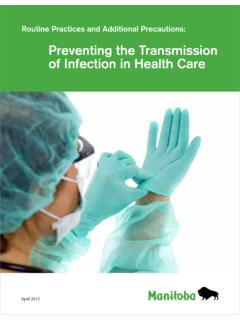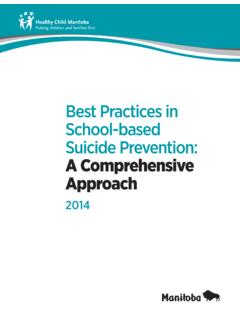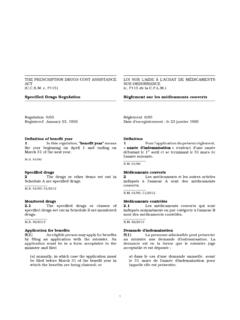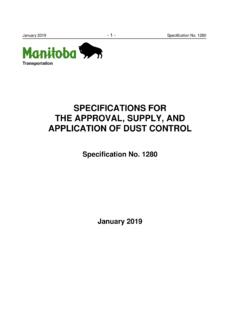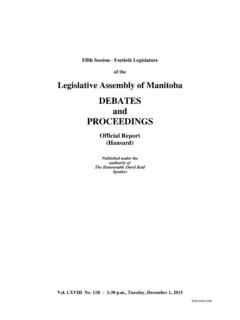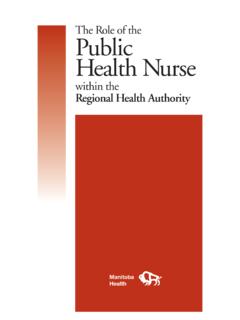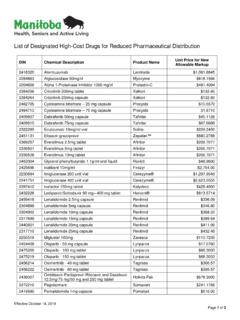Transcription of Fishing, Hunting & Gathering The Rights and ...
1 fishing , Hunting & Gathering The Rights and responsibilities of First Nations People in Manitoba First Nations people have always had a special relationship with the natural life forms that the land provides - like fish, wildlife and plants. This relationship is based on subsistence needs and cultural values extending back thousands of years. The Natural Resources Transfer Agreement (NRTA), which forms part of the Constitution Act, 1930, provides that Indian people have the right, which the Province hereby assures to them, of Hunting , trapping and fishing game and fish for food at all seasons of the year on all unoccupied Crown lands and on any other lands to which (they).
2 May have a right of access. Treaty and Aboriginal Rights relating to Hunting , fishing and Gathering are also recognized and affirmed as part of the Constitution of Canada by Section 35 of the Constitution Act, 1982. With these Rights come responsibilities like conservation and safety. People have a responsibility to ensure that their actions in harvesting natural resources do not damage the local population of the resource taken. When the level of use is greater than the ability of the resource to sustain that use, the area can no longer meet the needs of the people.
3 At times, restrictions become necessary for all resource harvesters to ensure the survival of the wild populations. It is also important that all fishers and hunters be aware that safety is extremely important not only for themselves but also for other users of the land. For these reasons, there are some restrictions that are intended for conservation and safety purposes that apply to all Aboriginal users and licensed hunters and fishers. Hunting or fishing for food includes harvesting for food or traditional ceremonial purposes for yourself, your family, or other First Nations persons.
4 Meat or fish may be shared with non-status family members living with you in the same home. Non-Indian people may accompany Indian people that are Hunting or fishing , but may not help them to exercise their Hunting or fishing Rights . For example, non-Indian people could not set or lift nets, shoot an animal, carry a gun, search for or flush game, or take any meat, fish or animal parts. They could, however, assist in retrieval of game or transporting of game and fish while accompanying an Indian person. Similarly, licensed hunters and fishers can be accompanied by status Indians, but each may only exercise the Rights accorded to them individually.
5 All persons are encouraged to contact their local Natural Resource Officer to discuss specific questions. Hunting In recognition of treaty and constitutional Rights , when Hunting or trapping for food on lands where they have a right of access, status Indian people: do not require licences;. are not restricted to specific seasons;. are not restricted to bag limits. Status Indians generally have right of access to hunt for food within: Indian Reserves, Wildlife Management Areas, Provincial Forests, areas of Provincial Parks where licenced Hunting is permitted, unoccupied Crown lands, and other Crown lands where licensed Hunting or trapping is permitted.
6 Private land with the permission of the landowner or occupant;. Federal lands, such as community pastures and the Shilo Military Range, when such lands are opened to the public for Hunting , or with the permission of the Pasture Manager or Base Commander. No person may hunt within: Riding Mountain National Park, Birds Hill Provincial Park, Beaudry Provincial Park or Pembina Valley Provincial Park;. Areas of provincial parks closed to all Hunting ;. Refuges (for the species protected) and most Ecological Reserves.
7 There are circumstances where a First Nation community could construct a communal cabin on Crown land as an extension of the right to hunt or fish for food. Where there is a need for such a communal cabin, communities are asked to contact their local Manitoba Conservation office to discuss location particulars. fishing In recognition of treaty and constitutional Rights , when fishing for food, status Indian people: generally do not require licences, however, free General fishing Permits may be required on waters where there are multiple-use management or conservation concerns.
8 Except for conservation closures, are generally not restricted to seasons, limits or areas;. are not subject to gear restrictions such as gill net mesh size or the number of lines that can be used while angling, however, any nets or other unattended gear must be clearly marked with the owner's name and treaty number so that officers know the gear is legally entitled to be there and is not part of an illegal set or commercial set. may transport fish from the catch point to their nearest residence without a loadslip.
9 Status Indian people may engage in recreational fishing and angle in fish derbies without a licence, but are subject to all other fishing regulations when not fishing for food purposes. Conservation Requirements and Other Restrictions: The Rights of status Indians are subject to conservation measures and other restrictions that do not unduly infringe on food harvesting, therefore hunters and fishers may not: hunt protected wildlife for which all Hunting is prohibited, such as eagles, hawks, owls and polar bears.
10 Waste or abandon wildlife or fish;. use or possess lead shot while Hunting waterfowl;. sell, trade, barter or give away fish or the meat or any part of a wild animal taken under status Indian Hunting or fishing Rights , except that food may be given to another status Indian person; (When you kill an animal for food you can use the non-edible parts to make traditional handicrafts for sale. However, you cannot kill an animal for the sole purpose of making items for sale). hunt or fish for species or in areas closed to all persons for specific conservation reasons.
